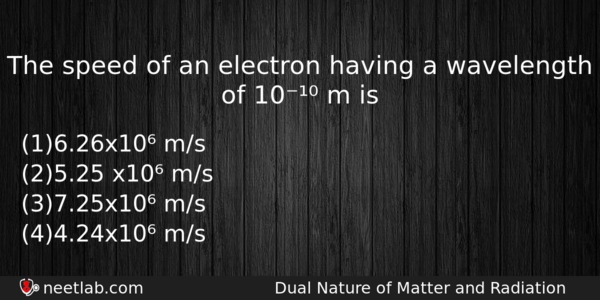| ⇦ | 
| ⇨ |
The speed of an electron having a wavelength of 10⁻¹⁰ m is
Options
(a) 6.26×10⁶ m/s
(b) 5.25 x10⁶ m/s
(c) 7.25×10⁶ m/s
(d) 4.24×10⁶ m/s
Correct Answer:
7.25×10⁶ m/s
Explanation:
λ = h / momentum = h / mv
v = h / mλ = 6.6 × 10⁻³⁴ / (9 × 10⁻³¹) × 10⁻¹°
v = 7.25 × 10⁶ ms⁻¹
Related Questions: - When 10¹⁹elecrons are removed from a neutral metal plate through some process,
- The ratio of minimum wavelengths of Lyman and Balmer series will be
- Two sources of sound placed close to each other are emitting progressive waves
- A wire of one metre length carries a constant current. The wire is bent to form
- A particle is executing the motion x=Acos (ωt-θ). The maximum velocity of the particle is
Topics: Dual Nature of Matter and Radiation
(150)
Subject: Physics
(2479)
Important MCQs Based on Medical Entrance Examinations To Improve Your NEET Score
- When 10¹⁹elecrons are removed from a neutral metal plate through some process,
- The ratio of minimum wavelengths of Lyman and Balmer series will be
- Two sources of sound placed close to each other are emitting progressive waves
- A wire of one metre length carries a constant current. The wire is bent to form
- A particle is executing the motion x=Acos (ωt-θ). The maximum velocity of the particle is
Topics: Dual Nature of Matter and Radiation (150)
Subject: Physics (2479)
Important MCQs Based on Medical Entrance Examinations To Improve Your NEET Score
18000+ students are using NEETLab to improve their score. What about you?
Solve Previous Year MCQs, Mock Tests, Topicwise Practice Tests, Identify Weak Topics, Formula Flash cards and much more is available in NEETLab Android App to improve your NEET score.
Share this page with your friends

P=h/lamba…..1equ
P= momentum
H=Planck’s constant
Lamba= wavelength
And
P=MV…..2 equ
M= mass
V= speed
Put 2 in 1
MV=h/lamba
9.1×10^-31*v=6.6×10^-34/10^-10
By solving u get the value of v
V=0.725*10^7=7.25*10^6